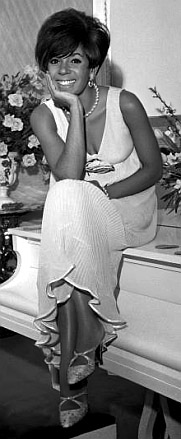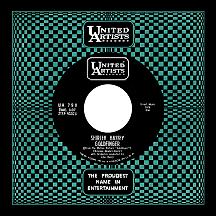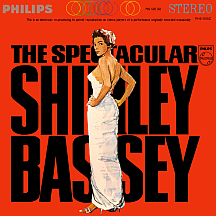SHIRLEY BASSEY
Goldfinger
The magnificent Shirley Bassey...she of the big, brassy voice, well-known these last seven decades for delivering impeccable renditions of standards and her specialty, stage and cinema songs and themes, developed a sexy, often-discussed stage presentation in the '60s when she was one of Britain's biggest stars. So where did the motivation come from to use such suggestive moves onstage, wearing low-cut dresses and strapless, backless oufits that might fall off should she lean or bend over a little too far? How did she overcome her shyness about such situations? Wait, what shyness? To "The Tigress of Tiger Bay," as she was referred to at one point, it all came quite naturally.
Her white Welsh mother, born Eliza Jane Start (more than 35 years older than tenth and youngest child Shirley), grew out of any shyness she may have had by the end of her teens. Having already given birth to two daughters who'd lived in poverty since infancy, she'd developed the motivation to do whatever necessary to feed, clothe and provide shelter for her children. She wasn't intimidated by men, likewise any high-and-mighty locals who looked down upon her. Eliza lived on the docks of capital city Cardiff's Tiger Bay area and wasn't hesitant about meeting the seafaring workers loading fish and/or merchandise from ships on a daily basis, worldly men who sought a good time at the area's many pubs and jazz clubs when the workday ended.
For better or worse, young Shirley learned about life from her mom. Which is not to say she wasn't somewhat reserved during her first decade-plus. But the things she witnessed became a normal part of life, to her and her one brother and six (of a total of eight) older sisters, all but the first two fathered by a succession of black African seamen. So when she embarked on a showbiz career at 16, shyness wasn't an issue...indeed, she'd made up her mind to be ready, willing and able to strut her stuff. Her impressive, naturally strong voice needed little training. It was all in the stage moves. And she developed those very quickly.
After mom's first husband bolted, the two eldest daughters were placed in the custody of relatives as a result of the difficulty their teenage mother had in attempting to provide for them. But Eliza was determined to support the others (though not prudent enough to avoid expanding the brood tenfold). Okun Apauso, a Nigerian shipman, had frequently journeyed from his home to the Cardiff area; in the mid-1920s he settled in Tiger Bay (preferring the rough life in this crime-ridden neighborhood over the much more brutal one in his hometown of Calabar). Changing his name to Henry Bassey, he made his arrangement with Eliza legal and proceeded to father five kids over the decade prior to Shirley's birth in 1937. They had a radio and it became the youngster's way of escaping from the harsh realities of life, if only for a short time each day. Her parents divorced before she was three. Henry stood trial for raping an underage girl and was convicted, then served five years in prison before being deported to Nigeria in '43. At some point, Eliza moved with her youngest ones to a different shack on a similar dock in the nearby neighborhood of Splott, a couple of miles north of where they were before. Shirley, who enjoyed singing for family and friends, began performing in local bars around the age of 13 or 14, for near-nonexistent wages (as little as one quid per night).
In 1953, 16-year-old Shirley left home to tour in the first of two revues; during this time, she turned up pregnant with her first daughter, Sharon Bassey, father undetermined. In 1955, while performing at London's Astor Club in Berkeley Square, former bandleader Jack Hylton got her a role in Such is Life on London's West End, a hit musical that soon toured the entire U.K. The following year she signed with Philips Records and enjoyed her first hit in '57 with "The Banana Boat Song," doing a Sarah Vaughan-esque rendition of the song most famously recorded by Harry Belafonte a few months earlier. There were two follow-up hits that year: "Fire Down Below" and "You, You Romeo," each edging a little closer to the sound she would become famous for.
The next two releases were her biggest hits yet: the playful "Kiss Me, Honey Honey, Kiss Me" and a dynamic ballad, "As I Love You" (a Jay Livingston-Ray Evans composition sung by Alan Copeland in the American film The Big Beat), the latter becoming Bassey's first U.K. number one hit in February 1959. She signed with Columbia Records and found continued success with number two seller "As Long As He Needs Me" from Lionel Bart's long-running West End production of Oliver! (London native Lily Klot, using the stage name Georgia Brown, performed the song in the musical). Shirley's international profile ticked upward, though making it in North America would prove difficult.
"You'll Never Know" and "I'll Get By," both top ten-ranking singles, had been popular during World War II. In September '61 she scored a seldom-seen two-sided U.K. chart topper with "Reach For the Stars," a dreamy tune by Austrian composer Udo Jürgens with English lyrics by Norman Newell (using his pseudonym, David West) and "Climb Ev'ry Mountain," from Richard Rodgers and Oscar Hammerstein II's The Sound of Music (the B side briefly touching down in the "Bubbling Under" region of the U.S. charts, her first appearance there). Her growing string of Brit hits and sold out shows gave her license to ramp up the onstage sensuality as gowns showed less fabric and more skin, giving her frequent headlines in the scandal sheets and a new nickname, "Saucy Shirley." When she made an all-important appearance at New York's Plaza Hotel, nothing about her look or brazen stage routine had changed.
Her first marriage, to Kenneth Hume (who doubled as her manager), came in 1961; there were two more top ten hits over the next two years, "What Now My Love?," a French song by Gilbert Becaud with English lyrics by Carl Sigman, and "I (Who Have Nothing)," an Italian composition by Carlo Donida with Jerry Leiber and Mike Stoller supplying the English part for Ben E. King's hit version. In 1963, Shirley gave birth to a second daughter, Samantha, but hubby Kenneth denied being the father (it was no secret he was gay, so few people challenged his claim). An affair she was having with actor Peter Finch pointed to him as the culprit, but the truth was never revealed.

The big U.S. breakthrough came in early 1965. "Goldfinger" (on United Artists, soon to be her U.K. label as well), the attention-grabbing, horn-saturated theme from the third big-screen James Bond spectacle starring Sean Connery as agent 007, became her one and only top ten U.S. hit, as she joined the ranks of British Invaders about a year after The Beatles' unprecedented arrival. Composer John Barry's musical contributions were a key component in the success of the Bond series, though he was quick to point out Bassey's performance was of equal importance, an opinion given weight when the film soundtrack reached number one on the U.S. album charts in March (something no other 007 soundtrack has accomplished). Her high-profile success, including concerts and television appearances, revealed something to western fans that many hadn't immediately been aware of: the color of her skin. But it mattered little. She was actually the first of two singers from Wales to gain prominence in the western hemisphere that year; a few months later, Tom Jones (a small-town boy from Trefforest in Pontypridd, just a stone's throw to the north of Cardiff's location on the shores of Bristol Channel), captured the spotlight, his career comparable to Bassey's in the U.K., but much more prominent in the Americas.
Shirley's marriage was not built to last. Reason for the divorce? Sexual preference, infidelity, nope!...neither was the primary cause. Seems Humes had gambled away a large portion of his famous wife's earnings. But c'mon, the relationship was a bad idea from the start. By the way, Finch's wife left him too; Bassey was named in their divorce as he'd been in hers. None of this affected her professional standing as she kept selling records, performing in top venues and receiving radio play. She recorded a Bond-imitation theme (a low point for composer Lalo Schifrin?) for The Liquidator starring Rod Taylor, which had a disappointing theatrical run less than a year after the bloated Mr. Goldfinger tried to steal all the gold bars from Fort Knox. Bassey bounced back with "Big Spender" (penned by Cy Coleman and Dorothy Fields) from the '66 Broadway musical Sweet Charity, one of her most popular live performance numbers (which had a similar effect on the career of divalicious U.S. singer Peggy Lee).
In 1968, Shirley married Sergio Novak, a successful hotel manager in Venice, Italy; two years later, Shirley's niece, Barbara Allen, had serious personal issues and could no longer care for her son Mark, so the Novaks legally adopted him (their marriage lasted eleven years, most of that time spent living in Switzerland). Her hit U.K. recordings of the early '70s include "Something," the great Beatles song penned by George Harrison (while there were many male covers, hers is the best-known female version), and "Never, Never, Never (Grande, Grande, Grande)," another song (Italian) with lyrics (English) by Newell. Both were top ten in Britain and the latter reached the U.S. charts.
Stateside, she's mainly known for her 'midas touch' hit, "Goldfinger"...and two other songs. The theme from 1972's entry in the James Bond series, "Diamonds Are Forever," was composed by John Barry and Don Black. Longtime colleague Lionel Bart penned the title theme from '79's "Moonraker" starring Roger Moore. She nailed them both. The honor of performing three official themes for the still-going-strong 007 film franchise is hers and hers alone. Yet the struggle wasn't over; there was one more rough spot she would have to endure: the death of second daughter Samantha Novak, whose body was found in Bristol, England's River Avon. Shirley's distress caused her to lose her voice for a time...and the cause of death has never been determined.
As she entered her fifties in the late 1980s, the fabulous diva entered an electronic music phase, scoring hits with Swiss duo Yello ("The Rhythm Divine") in '87 and Propellerheads ("History Repeating"), a number one U.S. dance hit in '97. Years later, a Bond mashup with Kanye West ("Diamonds From Sierra Leone") became a top ten U.K. hit as she reached the ripe young age of 68. Dame Shirley Bassey has lived in Monaco since before the 20th century began, a thousand miles from her Tiger Bay birthplace, though it might feel more like a million light years from the home she knew as a youngster.



